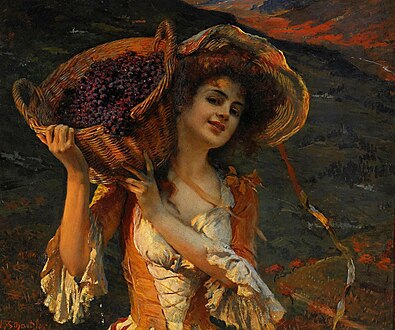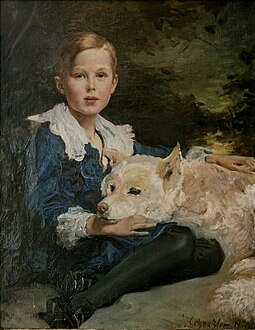Leopold Schmutzler

Leopold Schmutzler (29 March 1864 – 20 June 1940) was a Bohemian-born German painter. He specialized in portraits, semi-erotic female figures, and Rococo-style genre scenes. In his later years he supported the Nazi Party, ruining his reputation.
Biography[edit]
He was born in Mies. His father was a saddler and innkeeper, who also gave him his first drawing lessons. Originally, he planned to attend the "Naval School of Music" in Pula, but was turned down for poor eyesight.[1] From 1880 to 1882, he studied at the Academy of Fine Arts, Vienna with Christian Griepenkerl (the person who later rejected Hitler's application to the Academy). After that, he transferred to the Academy of Fine Arts Munich and studied with Otto Seitz. He settled there after his graduation in 1885.[1] He also spent brief study periods in Rome and Paris.
By the turn of the century, he had become one of the busiest portrait painters in Munich. He received important commissions from the Bavarian Royal Family, but also portrayed dancers and other popular performers. In fact, one of his best-known portraits was of the actress Lili Marberg in the role of Salome.[1][2]
His style was generally realistic with Art-Deco elements. He always paid great attention to his subject's clothing but, conversely, also painted many nudes. In the thirties, he became a supporter of the Nazis and created a series of works that reflected the Blut und Boden ideology. In 1940, not long before his death, Jungfrauen nach der Arbeit (Maidens after Work) won a major award at the Große Deutsche Kunstausstellung in the Haus der Kunst and was purchased by Hitler for 7,000 Reichsmarks.[3]
His association with the Nazi regime virtually destroyed his career outside Germany, and his posthumous reputation, although his works may still be seen at several museums, including the Frye Art Museum in Seattle whose founder, Charles Frye (1858–1940), was a great admirer of Schmutzler's pre–Nazi work.[3]
Selected paintings[edit]
-
Young Woman with Lyre
-
Farm Girls (or "Maidens") after Work
-
Lili Marberg as Salome (c.1905) The Jack Daulton Collection
-
Portrait of Crown Prince Rupprecht von Bayern
-
La vendangeuse
-
Salome, 1920
-
At the dance rehearsal
-
Hrabia Bolko Konrad Friedrich (1910-36), 1910
-
Young Beauty, by 1940
References[edit]
- ^ a b c *Biographical sketch from the Österreichisches Biographisches Lexikon 1815–1950.
- ^ Leopold Schmutzler / Salome symbolismus.com
- ^ a b Biographical notes and commentary @ GermanArtGallery.
External links[edit]
- 1864 births
- 1940 deaths
- People from Stříbro
- German portrait painters
- Academy of Fine Arts Vienna alumni
- Propaganda art
- German Bohemian people
- 19th-century German painters
- 19th-century German male artists
- German male painters
- 20th-century German painters
- 20th-century German male artists
- Emigrants from Austria-Hungary to Germany









